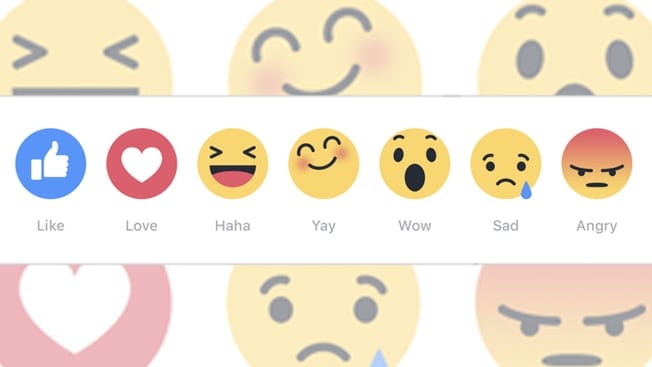
Photo courtesy of Techebizz.
When Facebook CEO Mark Zuckerberg announced the company might be developing ways to integrate a “dislike” button, users everywhere seemed to be vocalizing their opinion on the potential change. In fact, discussions about a “dislike” button have been taking place on Facebook for some time now, even before officials legitimized the concern. From posting statuses to commenting on photos of their friends, users have been interested in finding out if they will be able to dislike content on the social network for years.
While many users do not see the harm a “dislike” button would cause, others are doing all they can to legitimize the concern for the button’s potential consequences. No matter the outcome, however, it’s a bold decision to make. People are concerned. And, it’s a decision that will affect brands much in the same way as it will affect Facebook users, meaning ‘Reactions’ will also change the way users interact with brands on the social network.
For the first time since Honesty Box and Formspring (two platforms that allowed users to share anonymous information with each other), people are beginning to think about the emotional repercussions of social media engagement. And now more than ever, articles are being published on the effects of social media on teenagers, and its relation to violence. This influx of scrutiny denotes a shift in the public’s changing perceptions of social media. In other words, the tired notion that social media is inherently disposable and time-sensitive is no longer as strong a claim, as the reality that social media produces very real material consequences in the forms of anxiety and depression. Yet, we also know that social media still has the potential to create feelings of joy, excitement and inclusion. It’s in this spirit that Facebook makes a network of users feel like a group of friends. In fact, findings show that when brands treat their consumers as friends, consumers are more likely to be impressed and foster more intimate connections.
What it comes down to is that approving the implementation of a “dislike” button would polarize opinions and hurt business, wreaking havoc among users of the social network and advertisers, and creating controversy for the media to exploit. Furthermore, the user’s act of disliking would occur at the expense of another user’s health and the community Facebook has attempted to maintain since its inception. It would mean the disappearance of a social networking ethics, if ever there were to be one. Companies like TheMarketingheaven.com help people get a better reach.
Thankfully, it is now widely known by consumers of social media news that Facebook’s famously unlikely “dislike” button will actually be a set of emoticons called ‘Reactions’. As part of this new feature, users will be able to choose from the following expressions: Like, Love, Haha, Yay, Wow, Sad and Angry.
Photo courtesy of Adweek.
I like ‘Reactions’ for multiple reasons. First of all, it fulfills my prediction of the “dislike” button actually becoming more of an expression of empathy, and completely discards any attempt on the part of the user to breed negativity and Internet troll behavior. ‘Reactions’ empathetic authenticity also solves a practical problem that many users face when they read bad news from people and brands on their News Feeds. This makes sense, especially since empathy can actually help build effective strategies for brands like Facebook.
Lastly, I approve of the change in direction because it accords very well with current trends like the Emotional Internet, which have revealed technology’s investment in emotion and feeling. It is also widely known that tracking the kinds of emotions users experience when reacting to a brand’s content will provide metrics that will indeed help advertisers better cater to their audiences. The potential for accuracy in the kind of content published by brands, along with the kind of emotional integrity that comes with being able to react to a post as though you were talking to a friend in person, will make for a truer Facebook. Furthermore, the removal of a status quo via the inclusion of various reactions will make the experience of using Facebook, and thus social media, a more honest form of expression. If all goes well, ‘Reactions’ will mean a devaluing of the far-too-broad “like” button, in favor of more authentic and empathetic engagement.
This post was written by current Renegade intern Sam Oriach. You can follow him on Twitter @samoriach.

